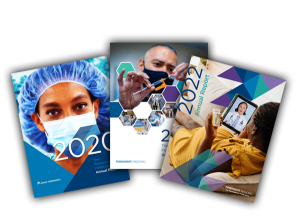The Permanente Federation 2023 Annual Report
Highlights of The Permanente Federation
Advancing quality in cancer care, precision medicine, and social health
Supporting our people and performance
A framework for measured success
Fostering a healthy physician workforce
Highlights of The Permanente Federation
The Permanente Federation experienced a year of accelerated innovation and adaptation in 2023. Working on behalf of the Permanente Medical Groups (PMGs) and in partnership with Kaiser Foundation Health Plan and Hospitals (KFHP/H), we furthered our commitment to high-quality care and adjusted to new challenges, rapid change, and increased economic headwinds.
The Federation accomplished this through collaboration with the PMGs to support the advancement of Permanente Medicine in clinical and care delivery innovation, access and operational performance, research outcomes, clinical workforce development, and growing our influence. The driving force behind these efforts are the more than 24,000 physicians and 87,000 medical support and administrative staff who deliver on the promise of person-centered care for 12.5 million Kaiser Permanente members.

Progressing patient care
In 2023, we found new and innovative ways to bring high-quality care to our patients, including in the home. The Federation helped operationalize Advanced Care at Home services in 6 Kaiser Permanente geographic areas. We also supported our physician leaders in their work to define and agree upon the essential services that Kaiser Permanente’s at-home care clinical model offers. And we played a key role in developing and gaining approval for a national technology business case to fund, design, and integrate technology solutions that support clinical at-home care operations.
Seeking to advance leadership collaboration among our medical groups, the Federation helped convene an in-person summit for PMG access and experience leaders to discuss improvement efforts for better patient support. Leaders aligned on a vision and started strategic priority discussions with executive medical directors (EMDs), creating a foundational framework for enhancing exceptional patient care at Kaiser Permanente.

Digital care innovations
Critical preparation for electronic health record patient navigation tools and AI-enabled ambient listening during 2023 paved a path to significantly improve patient experience. These advancements also stand to significantly improve physician workflow and well-being.
Our Federation-supported National Product Council, comprising of Permanente Medical Group, clinical, IT, sourcing, and finance leaders, worked together to establish a new cloud-based electronic health record system for radiology diagnostics and quality improvement. This national initiative enhances collaboration and streamlines clinical workflows that can be scaled and integrated across our system.
Kaiser Permanente’s telehealth program completed migration of individual and group video visits to a new single platform to improve the member and clinician experience.
Pushing care delivery forward
Building on our commitment to maintain a strong physician pipeline through medical education and training, our National Continuing Medical Education (CME) program provided credits to more than 22,000 clinicians and supported over 1,000 physicians in maintaining their certifications.
Partnering with groups from across the enterprise, we developed and published several documentation and coding policies, as well as guidelines to support accurate and complete data for patient encounters and claims. Additionally, we worked to create an outpatient and inpatient coding framework aimed at reducing health disparities and inequities while enhancing our quality reporting efforts.
Our National Continuing Medical Education program provided credits to more than 22,000 clinicians.
We were also active participants in the National Committee on Vital and Health Statistics’ workgroup focused on implementing a revised coding system for mortality reporting. This included consultation on morbidity classification and reducing administrative burdens.
Advancing quality in cancer care, precision medicine, and social health
Expanding on our excellence in cancer care, the National Cancer Expert Review Program was expanded beyond its initial pilot in Hawaii to Southern California, Northern California, Northwest, Mid-Atlantic States, and Georgia, providing physician-to-physician expert consults for 11 cancer types. Additionally, broader adoption of national oncology drug treatment pathways and a new electronic ordering capability for molecular genomic tests enhanced our already-timely, evidence-based care.
We also advanced the integration of precision medicine and genomics into routine care with the goal of improving screenings and follow-ups for members with genetic conditions. Enhancements to our electronic health record and laboratory data interfaces were deployed in Hawaii, Georgia, and Southern California — with more to follow — providing a strong foundation for clinical decision support tools.
We screened more than 2.6 million Kaiser Permanente members for social health vulnerabilities.
The Federation co-led the production and presentation of outcomes measures for cancer, cardiovascular disease, mental health, and women’s and children’s health. We re-evaluated our Dignified Journeys end-of-life care program to better align market-level measurement and inform progress, which included developing new measures to support Kaiser Permanente operations.
To better address social needs among our members, we collaborated with KFHP/H and Permanente Medical Groups to screen more than 2.6 million Kaiser Permanente members for social health vulnerabilities and connect 350,000 members to social health resources through our new Community Support Hub. We also continued to focus on improving health disparities by advocating for equitable maternal care for black mothers and funding 11 COVID-19-related research grants to explore the impact of the pandemic on prevention, health care utilization, and care gaps.
Supporting our people and performance
To better measure workforce climate and culture throughout the medical groups, we gained agreement for Permanente Medical Groups to use a set of common survey questions for physicians and clinicians. Common measures will help us create benchmarks that we can use to advance equity, inclusion, diversity, and wellness across our medical groups.
Continuing our commitment to Belong@KP, a national education initiative to foster inclusion and social justice in everything we do, Federation and KFHP/H People & Culture leaders co-created a 1-day immersive experience for Permanente executives and physician leaders that received greater than 70% participation. We also collaborated with KFHP/H on the 46th annual KP National Equity, Inclusion, and Diversity conference, with Permanente physicians and clinicians presenting or moderating.
We led a study of Permanente Medical Group physician benefits, which included internal and external benchmarking of comprehensive employee and retirement benefits. Additionally, we sponsored critical Permanente physician collaborative recruitment efforts as part of a steering committee to help Kaiser Permanente strengthen its standing as an employer of choice in health care.

A framework for measured success
Continuing our efforts to ensure a strong financial future, we worked closely with KFHP/H marketing and business development partners to develop a 10-year financial outlook for new lines of business based on high, medium, and low membership scenarios. Additionally, we partnered with Kaiser Permanente Ventures to support market valuation and tracking of strategic investments made by the Permanente Medical Groups.
The Federation co-led production and presentation of outcomes measures for cancer, cardiovascular disease, mental health, and women’s and children’s health to advance Kaiser Permanente’s strategic plan. We also facilitated alignment across Permanente Medical Groups to develop and collect standardized access metrics and produce a dashboard to help build improved communication efficiencies.
With EMD approval and funding from KFHP/H, we formed a Permanente B2B Advisory Committee launched in 2023. Historically, requests for information and clinical input into business-to-business (B2B) sales and marketing materials have come from multiple areas of the organization without a consistent place within Permanente for input. With the new committee, 4 physicians serve as group members to help support improved coordination and increased focus on areas where we can be proactive rather than reactive in the market.
Fostering a healthy physician workforce
In 2023, Southern California Permanente Medical Group, The Permanente Medical Group, The Southeast Permanente Medical Group, and Washington Permanente Medical Group received the American Medical Association’s Joy in Medicine Recognition Award, which recognizes health care organizations committed to reducing physician burnout.
The Federation also supported 25 physicians and employees from Permanente Medical Groups participating in the American Conference on Physician Health, which promotes research and actionable steps to improve physician well-being. And we collaborated with National Healthy Workforce to bring more Permanente Medical Group participation and physician presenters to Kaiser Permanente’s Well-Being Summit for the first time in its 10-year history.
Lifting physician voices and showcasing medical excellence
We supported a new series of communications from Federation co-CEOs Ramin Davidoff, MD, and Maria Ansari, MD, FACC, including a video where Permanente Medical Group executive medical directors outlined their commitment to leading through unity. Permanente physicians were also featured in prominent media, including a New York Times Magazine article on Kaiser Permanente Care at Home. We presented more than 20 PermanenteDocs Chat live programs in 2023 — including 4 co-presented with the American Medical Association — that featured Permanente physician voices speaking on timely topics facing the health care industry.
The Permanente Journal sponsored a roundtable discussion on value-based care, where care delivery experts discussed the evolution of payment models in medicine, equity, access, and clinical impact. To extend our reach and status as an employer of choice, we launched recruiting websites for Southern California Permanente Medical Group and Northwest Permanente that connect to the larger Permanente Medicine web ecosystem.
…both Federation co-CEOs were named by Modern Healthcare as among the “100 Most Influential People in Healthcare”
For the first time ever, both Federation co-CEOs were named by Modern Healthcare as among the “100 Most Influential People in Healthcare” for 2023. The recognition, which acknowledges individuals for demonstrating outstanding leadership and impact on the health care industry, was a testament to the powerful unified voice of our Federation leadership.
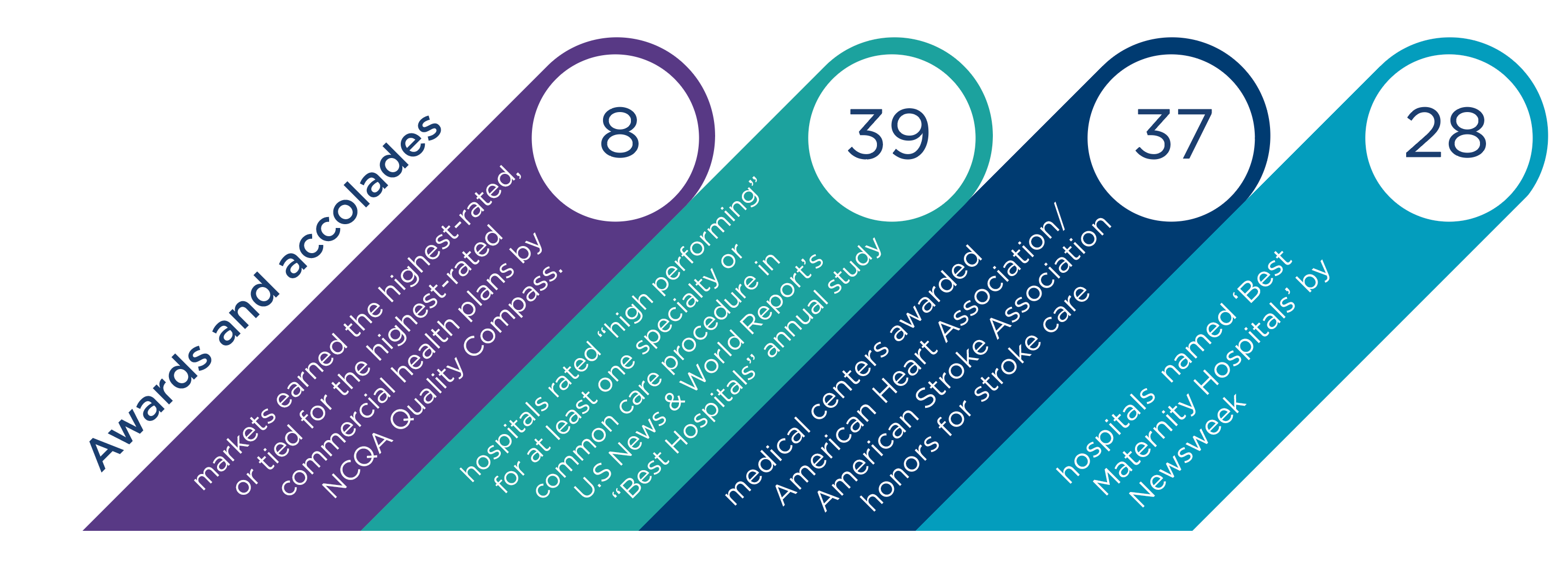
A seat at the table
In support of our longstanding ties to labor, Federation leadership partnered with KFHP/H to reach a new 4-year agreement with the Coalition of Kaiser Permanente Unions. On the government relations front, Permanente Medical Group EMDs returned to Washington, D.C. for their annual “fly-in” to meet with policymakers on issues such as physician workforce and value-based care. Their lobbying and advocacy at the Capitol set the tone for the Federation’s ongoing influence in government affairs.
An enduring mission
Amid an evolving health care landscape, the Federation and its commitment to fulfill the promise of Permanente Medicine remain more vital than ever before. Our executive medical directors, Federation Leadership Team, and functional departments continue to innovate, collaborate, and educate so that the future of medicine remains bright.
In service of the Permanente Medical Groups, we continue to support medicine that is person-centered, compassionate, evidence-based, technology-enabled, culturally responsive, and physician-led. It’s a model that guides us through triumphs and challenges while setting a gold standard for the practice of health care in America.
Permanente Medical Groups year in review
Propelled by accelerated innovation and the adoption of new technologies, Permanente Medical Groups improved patient access, expanded support pathways, and earned national accolades along the way — once again serving as a leading model for health care in America.
Hawaii Permanente Medical Group
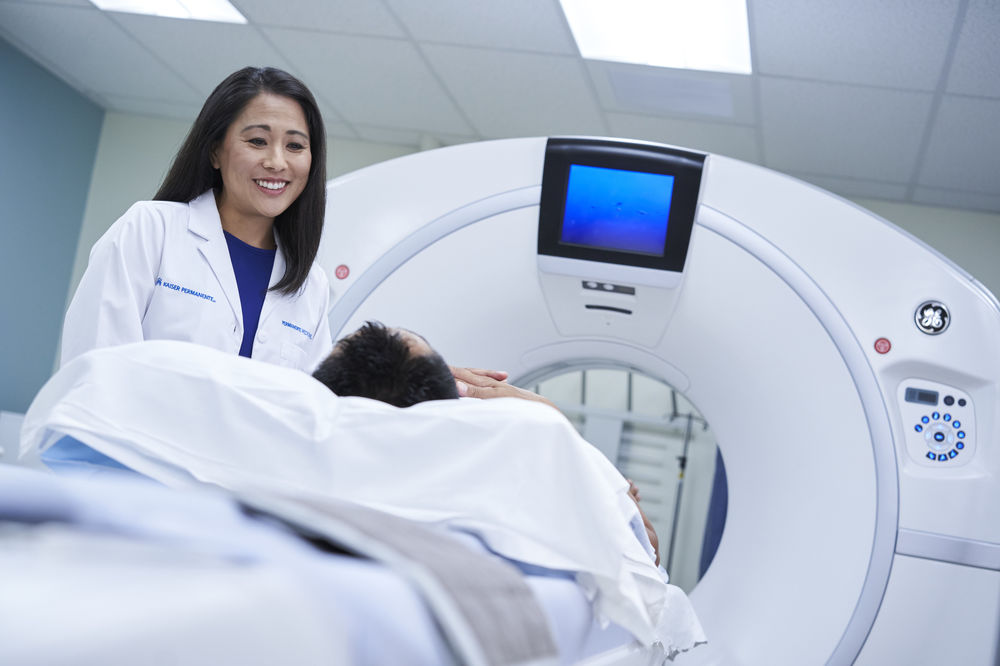 It’s impossible to look back at 2023 without acknowledging the remarkable Kaiser Permanente Hawaii response to the devastating Maui wildfires in August that claimed more than 100 lives and destroyed hundreds of structures, including the Lahaina Clinic.
It’s impossible to look back at 2023 without acknowledging the remarkable Kaiser Permanente Hawaii response to the devastating Maui wildfires in August that claimed more than 100 lives and destroyed hundreds of structures, including the Lahaina Clinic.
Hawaii Permanente Medical Group (HPMG) personnel immediately came to the aid of fire victims and played critical roles in the Emergency Operations Center and in establishing mobile community clinic sites across West Maui.
HPMG physicians were vital in introducing outpatient palliative care services and the launch of Kaiser Permanente Care at Home Hawaii Hospice. Innovations in clinical services included more advancements in minimally invasive heart procedures, with continued expansion of a new aortic valve replacement program. Furthering efforts to promote health equity and address the state’s physician shortage, HPMG expanded mentorship opportunities for students from Native Hawaiian and other backgrounds less likely to pursue medicine.
A record 223 HPMG “top doctors” were featured in Honolulu Magazine. Additionally, U.S. News & World Report and Newsweek recognized the flagship Moanalua Medical Center as a high-performing hospital and one of the world’s best hospitals, respectively.
Mid-Atlantic Permanente Medical Group
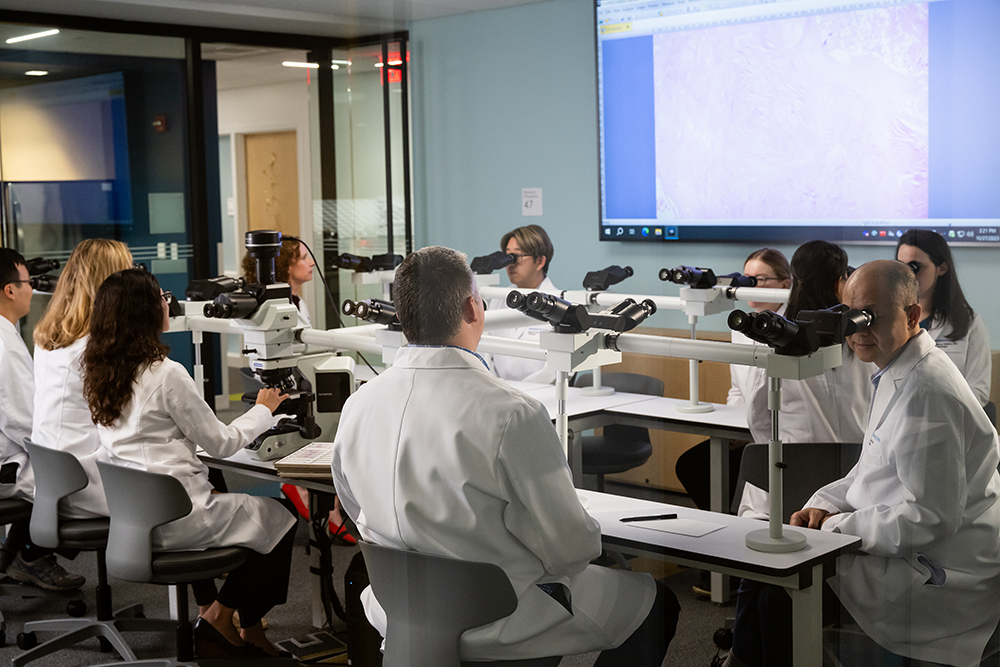 The Mid-Atlantic Permanente Medical Group (MAPMG) opened Kaiser Permanente’s first molecular genetics lab in 2023. The lab offers in-house biomarker and next-generation sequencing technology at the forefront of precision medicine, allowing medical oncologists to prescribe targeted, individualized treatments to patients diagnosed with cancer in record time.
The Mid-Atlantic Permanente Medical Group (MAPMG) opened Kaiser Permanente’s first molecular genetics lab in 2023. The lab offers in-house biomarker and next-generation sequencing technology at the forefront of precision medicine, allowing medical oncologists to prescribe targeted, individualized treatments to patients diagnosed with cancer in record time.
A record 250 doctors joined MAPMG during the year, ensuring the local pipeline for Permanente physicians remains strong. The additions grew the medical group’s count to 1,712 doctors.
Continuing a strong track record in quality care, the Kaiser Permanente Mid-Atlantic region achieved a rating of 5 out of 5 stars from the National Committee for Quality Assurance for its commercial (private) health insurance plan, a recognition of outstanding patient care, treatment, prevention and patient experience.
Northwest Permanente
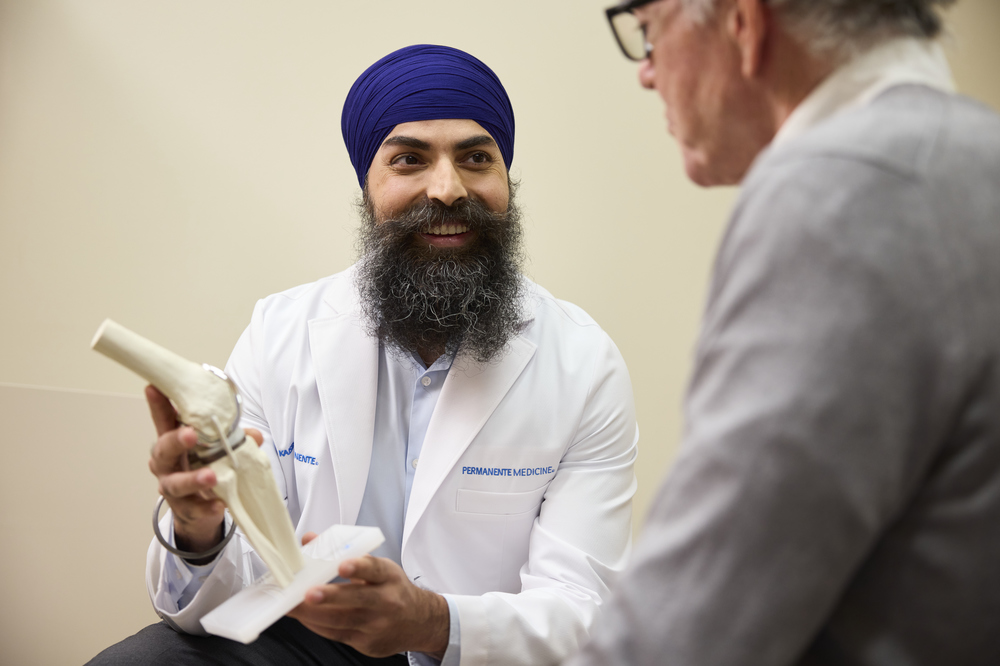
In 2023, Northwest Permanente (NWP) added 40,000 new virtual and in-person appointments, helping patients connect to the care they need faster. Additionally, a system improvement allows primary care physicians to connect their patients more efficiently with specialty care doctors — this resulted in an increase of eligible referrals directly booked from 12 percent to 30 percent, and a scheduling time reduction of a week or more for patients booking into specialty care.
Advancements in care without delay and the launch of the new clinical decision protocol at the Sunnyside Medical Center resulted in more nights at home for patients and significant improvement in hospital performance. U.S. News & World Report named Kaiser Permanente’s Westside and Sunnyside medical centers Best Hospitals for Maternity Care. Their high-quality care was exemplified by a reduction of postpartum hemorrhage rates to 6 percent, significantly lower than other hospitals in Oregon.
Plans to open the Center for Black Health and Wellness were also announced. The goal of the center will be to improve the health of Black members, elevate the patient experience, and create culturally responsive care and best practices that can be shared across Kaiser Permanente and the health care community.
Southern California Permanente Medical Group

Further advancing initiatives to improve patient access, Southern California Permanente Medical Group’s (SCPMG’s) on-demand patient care program topped 1.3 million visits. Through the Get Care Now program, which allows patients on-demand video or phone visits with a physician or urgent care, SCPMG conducted 55% more phone and video encounters in 2023 than in 2022. SCPMG also managed more than 63% of the total volume of Get Care Now usage at Kaiser Permanente.
Advanced Medical Care at Home programs have also been highly successful for both patient satisfaction and improving access to hospital beds. The expanded centralized support model reached its highest monthly admission volume and received near-perfect patient satisfaction scores of 97%.
Additionally, a review conducted by the National Cancer Institute’s Surveillance, Epidemiology, and End Results program showed that Kaiser Permanente Southern California’s 5-year survival rates are higher than the national average for 38 of the cancers that most impact patients.
The Permanente Medical Group
 The Permanente Medical Group (TPMG) in Northern California advanced its desktop medicine capabilities by piloting tech-enabled convenient care, expanding e-visits, creating flexible work options, advancing team-based care, and introducing new ambient AI scribe technology to support physicians.
The Permanente Medical Group (TPMG) in Northern California advanced its desktop medicine capabilities by piloting tech-enabled convenient care, expanding e-visits, creating flexible work options, advancing team-based care, and introducing new ambient AI scribe technology to support physicians.
All 15 of Kaiser Permanente Northern California’s maternity hospitals achieved “Birthing Friendly” status from the Centers for Medicare and Medicaid Services, and 11 hospitals were recognized by Newsweek among the “Best Maternity Hospitals” in the country. Four medical centers received Geriatric Surgery Verification from the American College of Surgeons, comprising half of all hospitals nationwide to receive this designation.
TPMG eliminated the disparity in human papillomavirus vaccination rates between boys and girls and achieved rates above the 90th percentile for all race and ethnic groups. Additionally, incidence of cervical precancer (CIN2+) in patients between the ages of 21-24 dropped by 90%.
Kaiser Permanente received the highest possible 5-star “Overall Quality” rating from Covered California and 5 stars from the California Office of the Patient Advocate — the highest ratings in the state.
The Southeast Permanente Medical Group
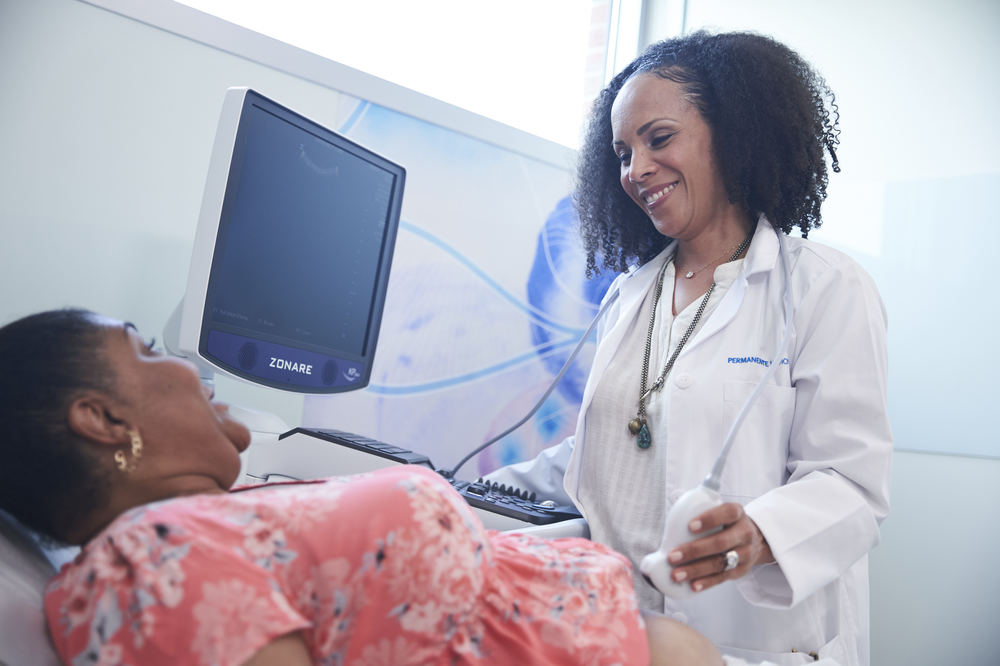 In 2023, The Southeast Permanente Medical Group (TSPMG) transitioned care of patients to Emory Decatur Hospital in Atlanta. The move helped reduce time in hospital for patients, improved bed capacity, and aligned cultural and organizational values. It also supported the Year of Care Experience program within TSPMG, which highlights the importance of treating each member as an individual, solving their problem in the moment, and leaving a positive lasting impression.
In 2023, The Southeast Permanente Medical Group (TSPMG) transitioned care of patients to Emory Decatur Hospital in Atlanta. The move helped reduce time in hospital for patients, improved bed capacity, and aligned cultural and organizational values. It also supported the Year of Care Experience program within TSPMG, which highlights the importance of treating each member as an individual, solving their problem in the moment, and leaving a positive lasting impression.
To meet evolving patient demands, TSPMG introduced its new Virtual Medical Center (VMC) for remote hospital-level care. The VMC builds on Kaiser Permanente Georgia’s existing services and infrastructure to provide virtual care when, where, and how members want it.
TSPMG continued to focus on reducing health care disparities, using a multifactorial approach to improve rates of colorectal screening in Hispanic population. The medical group’s Cocoon Pregnancy Care Model for equitable perinatal safety, which reduces maternal morbidity and mortality risks during pregnancy, was highlighted in publications such as NEJM Catalyst for its effectiveness. The model has nearly doubled screenings for potential postpartum complications in the first postpartum week since its implementation.

